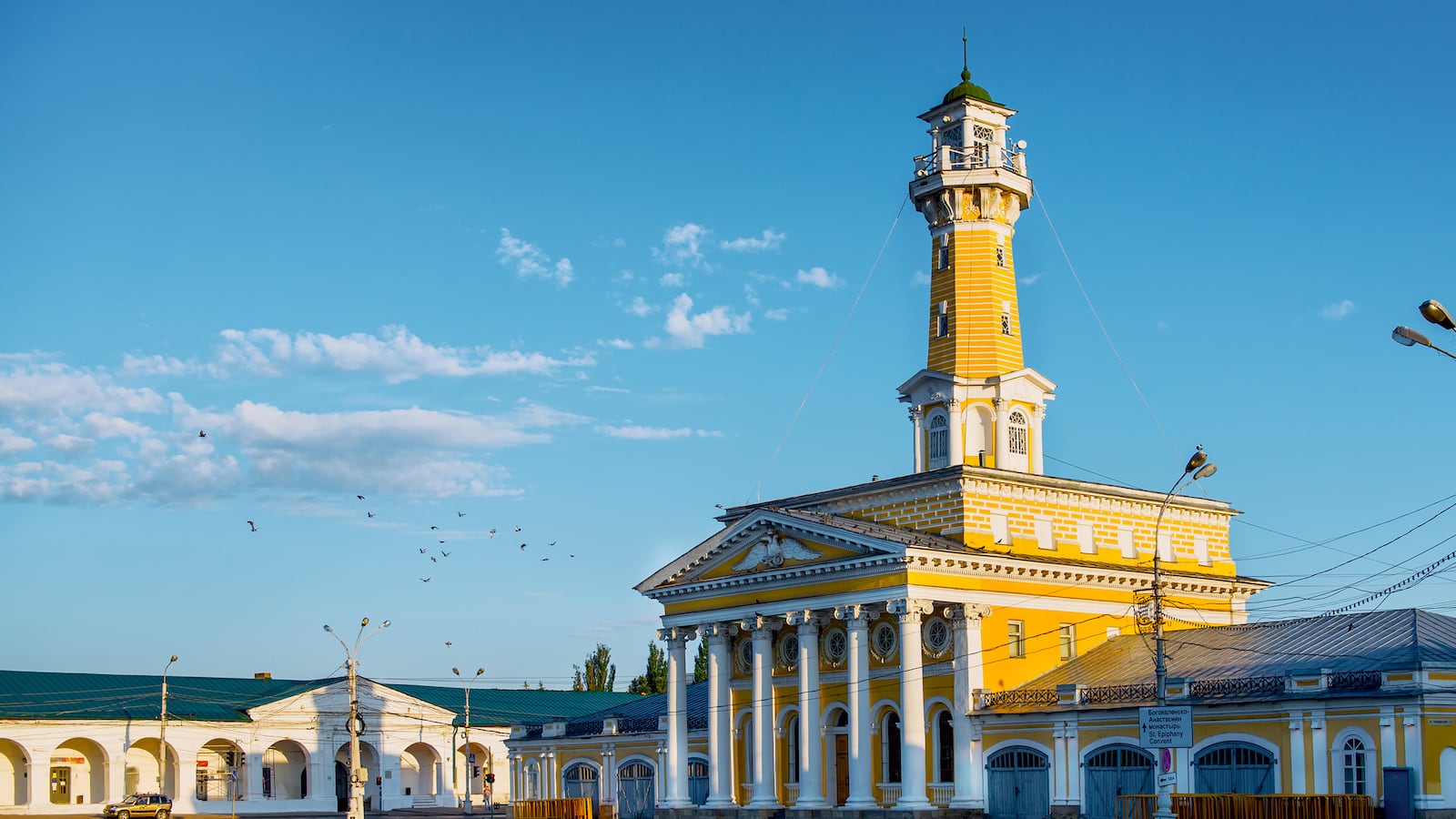RAI, Russia—The central square of Vokhma town, in the Kostroma region of central Russia, looked like a scene from some brutal documentary about post-Soviet decay: an abandoned diner called Pelmeni, or Dumplings, on the corner; the remains of a half-destroyed church that was blown up more than 50 years ago; and a few crooked houses along crumbling asphalt roads. Only stray dogs, pigeons and a few barely walking drunks could be seen on the square under the pale northern sky. And Vokhma town was the last outpost of civilization—a few grocery stores, hairdressers, a clinic and gas stations—on the road to this village with the sad name of Rai, or Paradise.
You might think such a town a pretty thankless place to start building a democratic process. The Kremlin’s overwhelmingly powerful United Russia party is in full control at all administrative levels. State propaganda in this bankrupt region has inspired deep hatred for everything Western, perhaps including the defamed notion of democracy. But the Kremlin’s opponents—even as few, obscure and repressed as they are—decided to give it a try. Last month, for the first time in many years, the opposition RPR-Parnas party ran primaries in three Russian provincial regions: Kostroma, Novosibirsk and Kaluga, where not many people knew what the word “primaries” meant.
A few slow hours on a wildly bumpy, muddy road, and here we were in the half- abandoned village of Paradise, with black, crooked houses, a heavy-drinking population, and everybody depressed and angry with Kostroma and Moscow authorities. Paradise seemed forgotten among the fields covered in wild grass, the beginning of the taiga that stretches like an enormous blanket over the vast lands of Siberia and beyond. Next to Paradise is a village called Jerusalem. Such names suggest how much faith it took to survive here in the old days, or, indeed, how much it takes now. But that’s dwindling.
Kostroma region has lived for a long time on the verge of bankruptcy. Corrupt leaders of business and political monopolies sucked the last juice out of the province. The majority of the male population has been surviving on less than $100 a month in Kostroma villages and the drinking begins in the in the early afternoon. There is deep disbelief that anybody in Moscow would ever show interest in these hopeless parts of Russia.
Part of the RPR-Parnas strategy is to show that’s not true. But life can turn into hell for anybody who joins or supports the Kremlin’s critics. RPR-Parnas members running in the elections have a greater chance of losing their jobs and being morally or physically attacked than of triumphing on polling day.
This year has been especially grim for RPR-Parnas since the party’s leader, Boris Nemtsov, was shot in Moscow right by the Kremlin’s wall last February. And yet Nemtsov’s followers kept their spirits up, turning memory of their friend into a source of inspiration.
“It was important for us to make the first step to forming legitimate culture for our RPR-Parnas party, to demonstrate that we members interact not as a corporation but as a civil society structure,” said Ilya Yashin, the winner of the party’s primaries in Kostroma, where in the end only about 1,000 people voted.
Attacks and scandals erupted as soon as the opposition party members arrived in the provincial capital. Somebody distributed fliers warning citizens not to go near the opposition members who had arrived in the region “to rob, rape and kill, as they did in Ukraine.”
Earlier this week, Yashin visited the town of Bui in the Kostroma region, which has for the moment a population of about 24,000 people. Every year a few hundred more people move away. But the local mayor accused Yashin of pushing Russia “to fall apart, to disappear.”
Several independent election candidates, campaigning for municipal and regional parliaments, also suffered from pressure by the Kremlin’s United Russia party. To register for elections, each independent candidate or party list had to collect at least 2,800 “approved” signatures. Kostroma election authorities rejected independent candidate Maksim Guterman, for instance, due to “invalid” dates under the voters’ signatures. Earlier this month, local bureaucrats caused trouble for opposition organizers of an economic forum. Eventually a few hundred delegates had to meet secretly, in the style of pre-Perestroika underground.
The reality in Kostroma contrasts sharply with the Kremlin’s rhetoric. At a meeting with the Moscow political elite, Viacheslav Volodin, the Kremlin’s key ideologue and deputy head of presidential administration, said that Russia needed “honest, legitimate, transparent and unpredictable elections.” Volodin promised to control personally the process of election campaigns in order to avoid scandals. But what could be more scandalous than the reality of nonexistent roads, dying agriculture and hundreds of bright, talented young people trying desperately to escape from the depressed Kostroma region?
Russia’s agricultural and timber regions have been waiting for the state to pay attention to their slow death for decades. Today, after 16 years of rule by Vladimir Putin, local people in villages like Paradise do not have much hope left for revival.
But maybe it is the sheer hopelessness that inspires the liberal opposition and also centrists like Yuri Krupnov, who told The Daily Beast that even though the elections look to be non-transparent and scandalous long in advance, “To me, Russia’s Paradise village symbolizes Russia: if we figure out how to revive Paradise, we will know how to rebuild industry and agriculture all across our country,” he said. “But the problem is that our authorities are not interested in creating jobs, even if the population [in these rural areas] shrinks by half. For as long as there are at least 50 million Russians in a few big cities feeding the oil and gas pipelines and lining their pockets, the men in power feel happy.”






